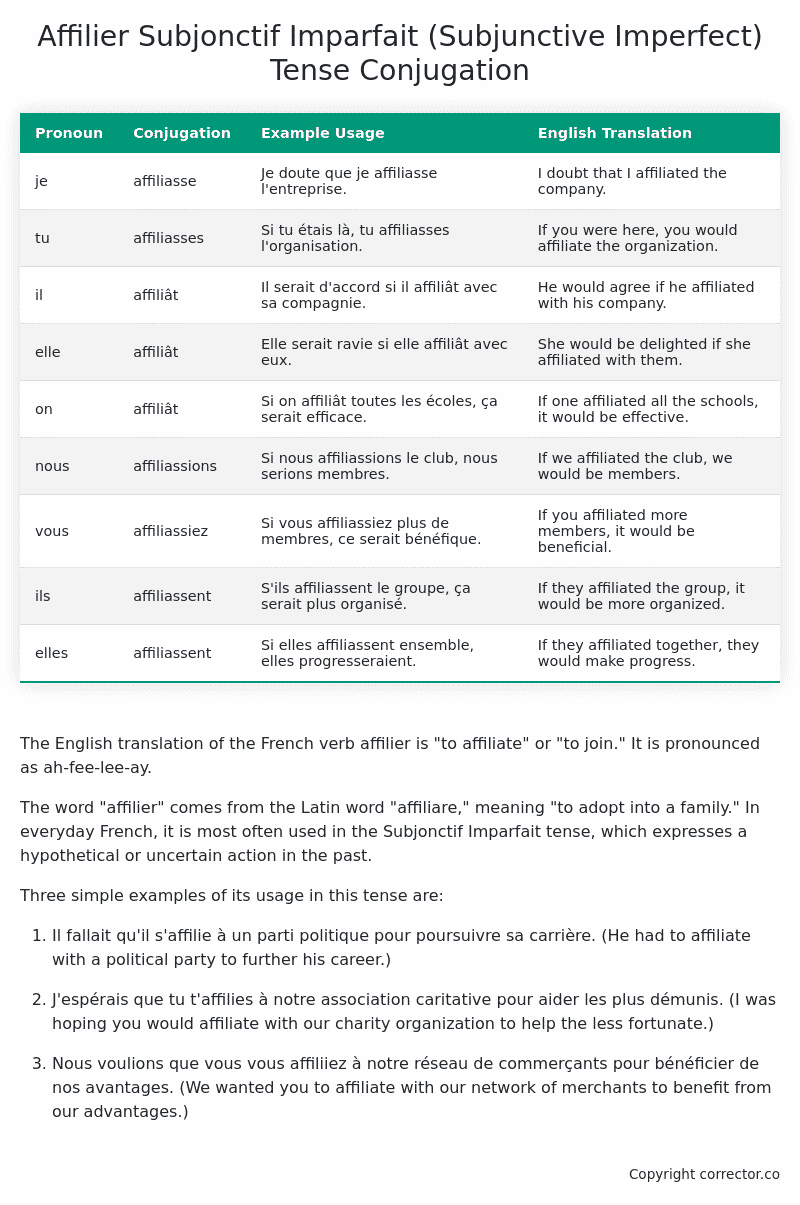Subjonctif Imparfait (Subjunctive Imperfect) Tense Conjugation of the French Verb affilier
Introduction to the verb affilier
The English translation of the French verb affilier is “to affiliate” or “to join.” It is pronounced as ah-fee-lee-ay.
The word “affilier” comes from the Latin word “affiliare,” meaning “to adopt into a family.” In everyday French, it is most often used in the Subjonctif Imparfait tense, which expresses a hypothetical or uncertain action in the past.
Three simple examples of its usage in this tense are:
-
Il fallait qu’il s’affilie à un parti politique pour poursuivre sa carrière. (He had to affiliate with a political party to further his career.)
-
J’espérais que tu t’affilies à notre association caritative pour aider les plus démunis. (I was hoping you would affiliate with our charity organization to help the less fortunate.)
-
Nous voulions que vous vous affiliiez à notre réseau de commerçants pour bénéficier de nos avantages. (We wanted you to affiliate with our network of merchants to benefit from our advantages.)
Table of the Subjonctif Imparfait (Subjunctive Imperfect) Tense Conjugation of affilier
| Pronoun | Conjugation | Example Usage | English Translation |
|---|---|---|---|
| je | affiliasse | Je doute que je affiliasse l’entreprise. | I doubt that I affiliated the company. |
| tu | affiliasses | Si tu étais là, tu affiliasses l’organisation. | If you were here, you would affiliate the organization. |
| il | affiliât | Il serait d’accord si il affiliât avec sa compagnie. | He would agree if he affiliated with his company. |
| elle | affiliât | Elle serait ravie si elle affiliât avec eux. | She would be delighted if she affiliated with them. |
| on | affiliât | Si on affiliât toutes les écoles, ça serait efficace. | If one affiliated all the schools, it would be effective. |
| nous | affiliassions | Si nous affiliassions le club, nous serions membres. | If we affiliated the club, we would be members. |
| vous | affiliassiez | Si vous affiliassiez plus de membres, ce serait bénéfique. | If you affiliated more members, it would be beneficial. |
| ils | affiliassent | S’ils affiliassent le groupe, ça serait plus organisé. | If they affiliated the group, it would be more organized. |
| elles | affiliassent | Si elles affiliassent ensemble, elles progresseraient. | If they affiliated together, they would make progress. |
Other Conjugations for Affilier.
Le Present (Present Tense) Conjugation of the French Verb affilier
Imparfait (Imperfect) Tense Conjugation of the French Verb affilier
Passé Simple (Simple Past) Tense Conjugation of the French Verb affilier
Passé Composé (Present Perfect) Tense Conjugation of the French Verb affilier
Futur Simple (Simple Future) Tense Conjugation of the French Verb affilier
Futur Proche (Near Future) Tense Conjugation of the French Verb affilier
Plus-que-parfait (Pluperfect) Tense Conjugation of the French Verb affilier
Passé Antérieur (Past Anterior) Tense Conjugation of the French Verb affilier
Futur Antérieur (Future Anterior) Tense Conjugation of the French Verb affilier
Subjonctif Présent (Subjunctive Present) Tense Conjugation of the French Verb affilier
Subjonctif Passé (Subjunctive Past) Tense Conjugation of the French Verb affilier
Subjonctif Imparfait (Subjunctive Imperfect) Tense Conjugation of the French Verb affilier (this article)
Subjonctif Plus-que-parfait (Subjunctive Pluperfect) Tense Conjugation of the French Verb affilier
Conditionnel Présent (Conditional Present) Tense Conjugation of the French Verb affilier
Conditionnel Passé (Conditional Past) Tense Conjugation of the French Verb affilier
L’impératif Présent (Imperative Present) Tense Conjugation of the French Verb affilier
L’infinitif Présent (Infinitive Present) Tense Conjugation of the French Verb affilier
Struggling with French verbs or the language in general? Why not use our free French Grammar Checker – no registration required!
Get a FREE Download Study Sheet of this Conjugation 🔥
Simply right click the image below, click “save image” and get your free reference for the affilier Subjonctif Imparfait tense conjugation!

Affilier – About the French Subjonctif Imparfait (Subjunctive Imperfect) Tense
Formation
Common Everyday Usage Patterns
Interactions with Other Tenses
Subjonctif Présent
Indicatif Passé Composé
Conditional
Conditional Perfect
Summary
I hope you enjoyed this article on the verb affilier. Still in a learning mood? Check out another TOTALLY random French verb conjugation!


